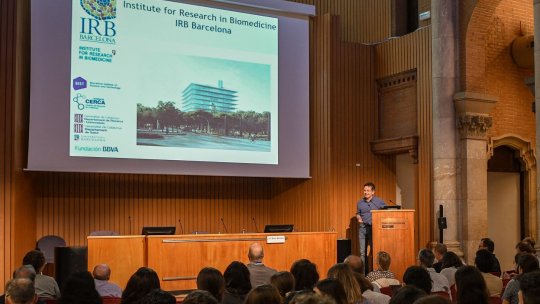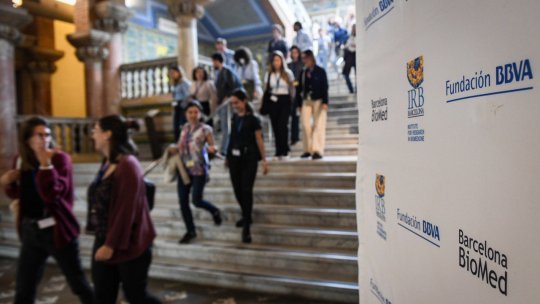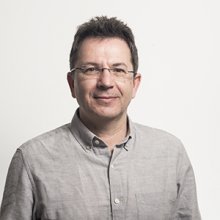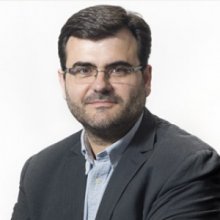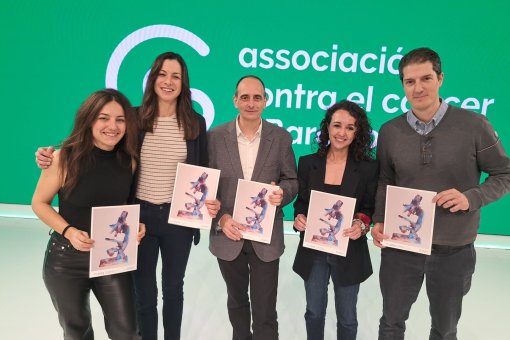Images
- IRB Barcelona and the BBVA Foundation will be bringing together over 150 scientists, including world-renowned experts, to discuss advancements in the fight against cancer in this promising field.
- The sessions will be held from October 17 to 19, in the Sant Pau Modernist complex, in Barcelona.
Cancer is a complex disease, and one that is caused by mutations and changes in the expression of protumoral genes. During the course of the disease, the metabolic requirements of cancer cells undergo changes, as the latter have significant demands in terms of protein production, which go beyond mutations and cellular DNA, and these needs determine both their interactions with the tissues in which they develop and with the immune system itself. This area of investigation is known as "post-transcriptional" regulation (in reference to the process that transforms DNA to messenger RNA, prior to forming proteins, which known as "transcription") and, despite the fact that it has already shown therapeutic potential, it is still an understudied field.
The IRB Barcelona and the BBVA Foundation are organizing the 37th Barcelona Biomed Conference, which will be held during the third week of October in order to promote understanding, foster debate and promote cooperation between leading experts in the field of post-translational regulation.
This meeting, which will take place from 17 to 19 October at the Sant Pau Modernist Site, is being organized by Dr. Raúl Méndez, an ICREA researcher and the head of the Cell Cycle Translational Control and Differentiation Laboratory at IRB Barcelona and is being co-organized by: Dr. Alexandre David from the Institut de Génomique Fonctionelle (IGF, Montpelier, France), Dr. Fátima Gebauer from the Centre for Genomic Regulation (CRG, Barcelona) and Dr. Georg Stoecklin from the University of Heidelberg and the Zentrum für Molekulare Biologie der (ZMBH, Heidelberg, Germany).
Cancer cells reproduce at a high rate and they compete with their neighbours for available nutrients, space and oxygen. This situation generates cellular stress in the body, and the regulation of these processes may be the key to a potential therapeutic approach in cancer treatment. The temporary response to adverse situations, such as stress, is largely regulated at the level of transcription or "translation", i.e. the transformation of genetic material into protein, and as such, understanding this process in the context of cancer is of vital importance.
With respect to this field, another area that the conference will be focusing on is the study of the relationship between cancer cells and the tumoral microenvironment, i.e., with the immune and vascular systems around the tumour. The meeting will also include the participation of scientists who are experts in the study of those cellular mechanisms required by these processes in tumour cells.
“Understanding the vulnerabilities of cancer cells in all these activities, in which they act differently from a “normal” cell, could lead to the discovery of new therapeutic targets. This Barcelona Biomed conference will bring together leading experts from around the world in this field, which has scarcely been explored when compared to other areas of oncology, and we hope that new projects, collaborations and ideas will push our understanding forward”, said Dr. Raul Mendez.
World Renowned Experts
Among those experts who will be sharing their latest advancements with those attending the conference are: Dr. Nahum Sonenberg, from the Goodman Cancer Research Center, McGill University in Montreal (Canada), who is a pioneer in discovering the relationship between cancer and RNA translation. Dr. Davide Ruggero, from the University of California, San Francisco (USA), who founded a biotech company for the development of cancer therapies based on translation process inhibitors. Dr. Anne Willis, from the MRC Toxicology Unit in Cambridge (United Kingdom), an expert in the study of cancer cell metabolism, and Dr. Eduard Batlle, who is also a researcher at the IRB Barcelona, who has investigated the role of ribosomes in tumour cells.
As well as leading figures in the field, the conference will also feature numerous talks from promising young researchers, who will be bringing new perspectives and dynamism to the programme.
Traslacore Encounter
The Traslacore European consortium on translation and cancer was created around this conference, bringing together around 80 research groups who are specialists in this field. The consortium, which is financed by a COST Action from the European Commission, will meet for the project launch after the Biomed conference has ended.
About IRB Barcelona
The Institute for Research in Biomedicine (IRB Barcelona) pursues a society free of disease. To this end, it conducts multidisciplinary research of excellence to cure cancer and other diseases linked to ageing. It establishes technology transfer agreements with the pharmaceutical industry and major hospitals to bring research results closer to society, and organises a range of science outreach activities to engage the public in an open dialogue. IRB Barcelona is an international centre that hosts 400 researchers and more than 30 nationalities. Recognised as a Severo Ochoa Centre of Excellence since 2011, IRB Barcelona is a CERCA centre and member of the Barcelona Institute of Science and Technology (BIST).

